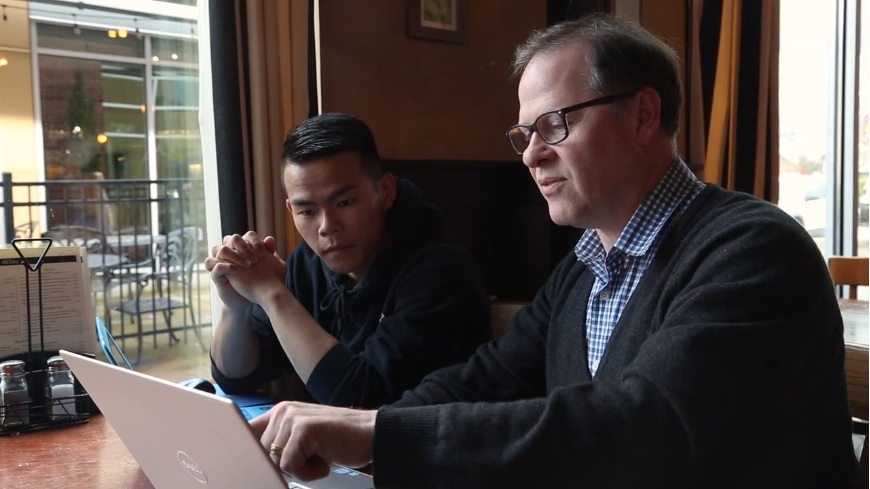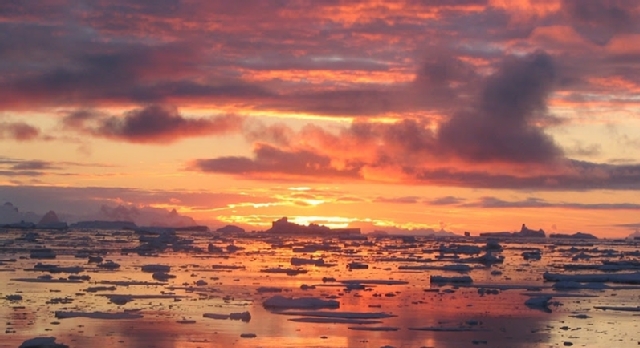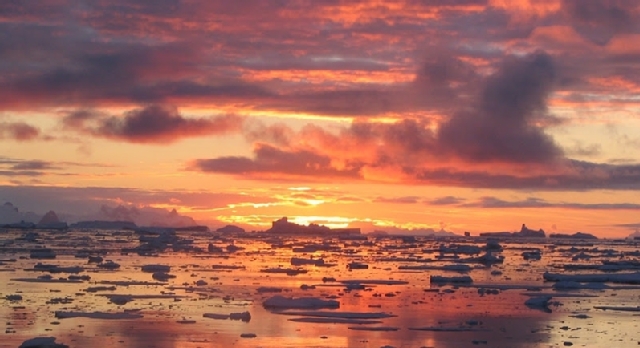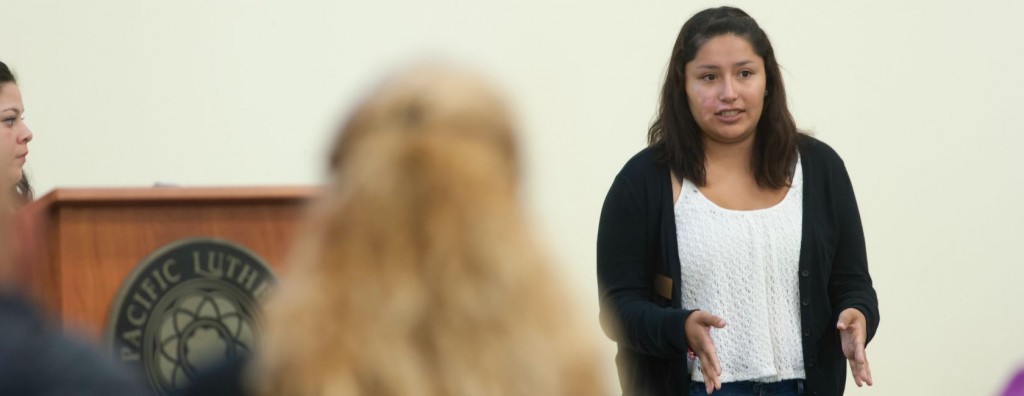Page 45 • (500 results in 0.056 seconds)
-

By Michael Halvorson, ’85 This week is Computer Science Education Week (Dec. 3-Dec. 9) in the United States. I helped celebrate on Monday at the Paul G. Allen School of Computer Science at the University of Washington in Seattle. The event was sponsored by Code.org…
Education Week honors the birthday of computing pioneer Admiral Grace Murray Hopper, who was born on December 9, 1906. Hopper was a pioneer of modern computer programming who invented some of the first computer compiler tools. Although December is a busy time of the year for teachers and students, this week honors one of our founders and focuses attention on how people learn to program computers and why that skill might be useful. Jeff Raskin, Melinda Gates, and Hadi Partovi address the crowd. (Photo
-
Dr. Samuel Torvend spent his sabbatical during the 2019-20 school year researching environmental consciousness and sustainability in early medieval monastic communities. Early medieval monasteries were built to last, he emphasizes. “When these monastic communities were established, they did not think they were going to be…
ways the diets of medieval Benedictines were very different from those of the average modern-day American. “It’s good to remember,” said Dr. Torvend, “that the lives of these communities were guided by the daily motion of the sun and moon, by the changing seasons of the year. They did not fly pineapples in from Hawaii or Costa Rica and hothouse tomatoes from Canada. They lived with what we would call a macrobiotic diet: a diet that would change with what was available at different times of the
-
Originally published in 2021 Dr. Samuel Torvend spent his sabbatical during the 2019-20 school year researching environmental consciousness and sustainability in early medieval monastic communities. Early medieval monasteries were built to last, he emphasizes. “When these monastic communities were established, they did not think they…
that focused on environmental ethics.In many ways the diets of medieval Benedictines were very different from those of the average modern-day American. “It’s good to remember,” said Dr. Torvend, “that the lives of these communities were guided by the daily motion of the sun and moon, by the changing seasons of the year. They did not fly pineapples in from Hawaii or Costa Rica and hothouse tomatoes from Canada. They lived with what we would call a macrobiotic diet: a diet that would change with
-

Spring is almost here. We just set our clocks forward an hour and throughout this semester students will have plenty of master classes to anticipate with an incredible variety of guest artists from disciplines. Keep reading to hear about the talented musicians, educators, and composers!…
resources, and how to choose literature for elementary choirs. Nicole Laborte, who spoke with our students last semester, will return to discuss teaching strategies and tools for teaching virtually. Guy Kovacs, principal at Kalles Junior High School in Puyallup, will speak on how to find teaching jobs and ace an interview. He has been recognized as Middle School Principal of the Year and is loved by his students and staff. PLU alumna Helene Beck will present on teaching elementary general music
-

Antarctic sunset. Photo taken by Samantha Dillon. Resource 2012 Wang Symposium: Our Thirsty Planet Wang Symposium: Activist fights to preserve the precious resource of water By Barbara Clements Maude Barlow didn’t start out interested in water. Nothing of the sort, she recalled recently from her…
English literature. Since that epiphany, Barlow has become a leading voice on water conservation and the view that it is a resource that should be conserved and administered as a public, not private resource. Maude Barlow She has authored 16 books, including “The Politics of Water”, “Blue Gold” and her most recent book “Blue Covenant” (2007, The New Press). Barlow is the recipient of 11 honorary doctorates as well as many awards, including the 2005 Right Livelihood Award (known as the “Alternative
-

“An Antarctic Sunset” taken by PLU student Samantha Dillion in 2006 during J-Term study away in Antarctica. Wang Symposium 2012: Water warrior fights to save our most precious resource By Barbara Clements Maude Barlow didn’t start out interested in water. Nothing of the sort, she…
fresh eyes,” said Barlow, who has a degree in English literature. Maude Barlow Since that epiphany, Barlow has become a leading voice on water conservation and the view that it is a resource that should be conserved and administered as a public, not private, resource. She has authored 16 books, including “The Politics of Water”, “Blue Gold” and her most recent book “Blue Covenant” (2007, The New Press). Barlow is the recipient of 11 honorary doctorates as well as many awards, including the 2005
-

Washington, D.C. (March 20, 2017)- When Scott Foss ’91 enrolled at Pacific Lutheran University, he dreamed of becoming a paleontologist and pursuing a career outdoors conducting research. Now, he’s a senior paleontologist at the Department of the Interior. Foss serves as a policy adviser and…
at PLU and have stayed in contact with the faculty throughout my career. I knew I wanted to become a paleontologist by the time I arrived on campus. I’ve always been interested in a lot of different things, and I was able to pursue them at PLU, knowing that I would eventually have to set them aside to focus on paleontology. I took a lot of classes to do with art, writing and literature coursework. I also played tuba in the wind ensemble and the crazy pep band PLU had back then, known as “commando
-

TACOMA, Wash. (Sept. 15, 2015)—As Hispanic Heritage Month kicks off across the country on Sept. 15, this year’s observation at Pacific Lutheran University takes on extra emphasis with two new campus-wide components: • the revival of a student organization representing Latino/a and Hispanic students, and…
diverse backgrounds of our students,” McCann said. Read Previous PLU Partners With Tacoma Schools to Offer Administrator Professional Certification Program Read Next PLU Music Professor Plays Instrumental Role in Chinese President’s Visit to Tacoma COMMENTS*Note: All comments are moderated If the comments don't appear for you, you might have ad blocker enabled or are currently browsing in a "private" window. LATEST POSTS Caitlyn Babcock ’25 wins first place in 2024 Angela Meade Vocal Competition
-

TACOMA, WASH. (Oct. 17, 2016)- MediaLab at Pacific Lutheran University, the multimedia, applied research organization that celebrates 10 years of success this fall, counts more than 200 students as participants throughout the decade. Those participants are invited to mark the organization’s milestone anniversary Nov. 5…
www.plu.edu/ml10 for more information. Read Previous Award-winning screenwriter, film director Laurel Minter to teach beginners’ workshop on screenwriting at PLU Read Next PLU professor composes music for ‘timeless’ Chinese opera featuring student and faculty performers, libretto by Zhang Er COMMENTS*Note: All comments are moderated If the comments don't appear for you, you might have ad blocker enabled or are currently browsing in a "private" window. LATEST POSTS Caitlyn Babcock ’25 wins first place in
-

Audrey Borloz ’24, Fani del Toro ’24, Aidan Donnelly ’25, Grady Lemma ’25, and Angela Rodriguez Hinojosa ’24 spent the summer focused on synthesizing organic compounds called antenna ligands for lanthanide ions. When these molecules interact with specific ions like europium(III) or terbium(III), they exhibit…
requires.” “We spent a lot of time researching literature experiments to gain familiarity with the reactions we planned to run. In my case, they rarely went according to plan, but I learned something each time, which helped guide me toward the next step.” "These lessons extend outside the lab, and this kind of continuous learning and reevaluation is helpful in both academic and professional contexts," stated Lemma. Professor Yakelis and Donnelly working together in open lab in Rieke Science Center
Do you have any feedback for us? If so, feel free to use our Feedback Form.


